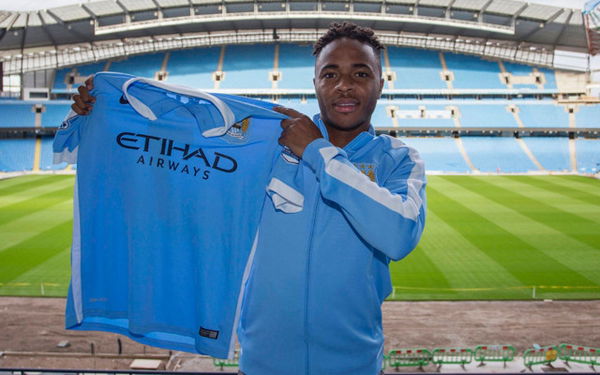

The recent transfer sagas of Fabian Delph and Raheem Sterling have once again stirred up the debate of ‘loyalty’ and how it no longer exists.
When a player leaves a club, a place which let him grow, fans who cheered his name, and teammates who always supported you, you are bound to upset many people. Sometimes comments made by players don’t help the cause. These players are branded as ‘traitors’, ‘greedy’, ‘snake’ and often brutally abused by the same fans who once cheered his name in the stands.

via Imago
Image Credits : PA
But for once let’s try to understand this situation from player’s prospective. Through out this article I will be comparing the player with an average employee working for some MNC.
ADVERTISEMENT
Article continues below this ad
The first part of the discussion starts with obvious reason of hatred towards the player – their lust for money. I would to ask a question to you all, if you are offered a better salary in some other company, won’t you switch or wouldn’t it at-least cross your mind tp consider this offer?
When it comes to us, we cite it as a “reward” for our hard-work. To be fair, in the same way, it is the reward of that particular player that he is offered a better contract by some other club. There is a reason why Manchester City chased Raheem Sterling and not Mario Balotelli – Sterling deserved it because of his hard-work and talents. Another factor that people overlook is the fact that apart from the player, the club also gets a heavy chunk of transfer money, which can be used to bring in more players. So next time you brand a player as “greedy”, ask yourself, what you would have done or did your club mind.

via Imago
Fabregas was subject to a lot of criticism after he joined Chelsea
The next part of discussion takes us to the second and more common reason of why players switch clubs – ambition. Again, the analogy of the employee is apt in the situation. Despite your obvious better talents than fellow colleagues, you are not provided with a better project, and then some other company offers you that, the one for which you worked hard for all your life, won’t you take it?
In the same way, why should a player be blamed for being ambitious? If Robin van Persie felt that the only shot at the Premier League was to move to United, what is wrong in that? He gave his 8 golden years to the London club, but still in eyes of most of the fans, he is a traitor. Is that just? Arsenal did get £24 million in exchange.
Not long before that, Wayne Rooney handed a transfer request to the club, as he felt that United may not be as ambitious as he desires. What followed made him the highest paid player in Premier League and was convinced by Sir Alex that United will never settle to be an average club. But no United fan will ever called him a traitor, despite his desire for money and ambition was obvious. Had Arsene Wenger acted in similar ways, van Persie might have stayed, and who knows he might have stayed more than he wanted just because of that!

via Imago
Torres had a torrid time at Chelsea.
Another factor that fans tend to forget is that it’s the player who goes through all the pressure. We all know the fate of Fernando Torres, from one of the best strikers on the planet, he became the flop of the decade, in the process of chasing his ambition. But in the process Liverpool got a hefty £50m and will now be more than happy with the transfer. The transfer which was loathed by Liverpool fans is now celebrated. It’s not just Torres, many players have similar stories. Ricardo Kaka, Andriy Shevchenko and Andy Carroll are just to name a few.
Quoting the nomadic Zlatan Ibrahimovic: “I have made a lot of moves in my life – I take it as a challenge, an adventure. And I have won eight titles in eight years with different clubs in different countries.
“But if you stay in one place all your life it is easy to play football. You are at home, you are in the comfort zone. But if you move to five different places it is a real test. If you succeed that’s when you become a real champion, that’s when you get more respect.”
If you ignore the obvious self praise, Ibrahimovic has made a striking point : It is easy to stay at the club you are doing good at. You are in your comfort zone But to move, you should have the courage and ability to adapt, because if the player fails, it is the player who will be labelled as a loser, not the club he left.
We need to shed some light on hypocrisy on our part. Many great managers often say that football has no room for emotions. So when a player is not performing, he has to be dropped. Rather it be the so called ‘fringe players’ or a long serving one, if you don’t perform you have to be out.
Recently Tom Cleverly and Danny Welbeck both were sold by Louis van Gaal, and for obvious reasons – these players according to him were not good enough for the club. But has anyone ever said that the club was not loyal to them? They were academy players after-all. Of-course not. In-fact their departure is celebrated by fans.
ADVERTISEMENT
Article continues below this ad
In a different type of case, we saw Petr Cech being dropped to the bench and ultimately sold after arrival of a younger and arguably better Thibaut Courtois. Cech, who served the club for 11 straight years was not given special treatment, after-all no player is bigger than the club.
Petr Cech is not an exception. Raul, Iker Casillas, Frank Lampard, all have met the same fate. Sometimes this works well for the club, sometimes it doesn’t. Andre Pirlo was not offered a new contract by AC Milan. The Italian joined Juventus and what followed is history. Similarly United let Paul Pogba go for free, who now could well become one of the best in the world. On the other hand there are clubs who purposely sell their best players. Southampton, Ajax and Porto and other feeder clubs have made their clubs into business model, and make a huge profit.
After all this, a question arises. A club has the right to sell or ‘off-load’ a player when he is not able to operate at the level club wants or when they require funds. But why does a player not have a similar right to leave the club if he thinks they doesn’t pay him enough or can’t assemble a better team capable of winning? In the end, winning is the most important aspect of sport, isn’t it?
ADVERTISEMENT
Article continues below this ad
There are players like Steven Gerrard, Francesco Totti, Javier Zanetti and many more, who are legends. Despite interests from numerous clubs, their desire to play for the club they love trumped any other desire, and are rightly respected. But as Ibra said, they always stayed in their comfort zone. Had Gerrard taken Chlesea’s offer(in 2003) and joined them, who knows how things would have fared. He could have won the Premier League which eluded him through out his career or he could have been a failure and tainted his career. But if a player takes up the challenge and at least tries to chase his dreams, are we justified in labeling him as a traitor?
Sterling (or any other player like him) may or may not be a success at his new club. He will definitely be judged if he was able to live up to his ‘price tag’ or not(ask Gareth Bale). He will be judged on whether he was able to achieve the success he wanted to. But let’s not blame him while he is on the quest for it.
ADVERTISEMENT
ADVERTISEMENT
ADVERTISEMENT
ADVERTISEMENT

